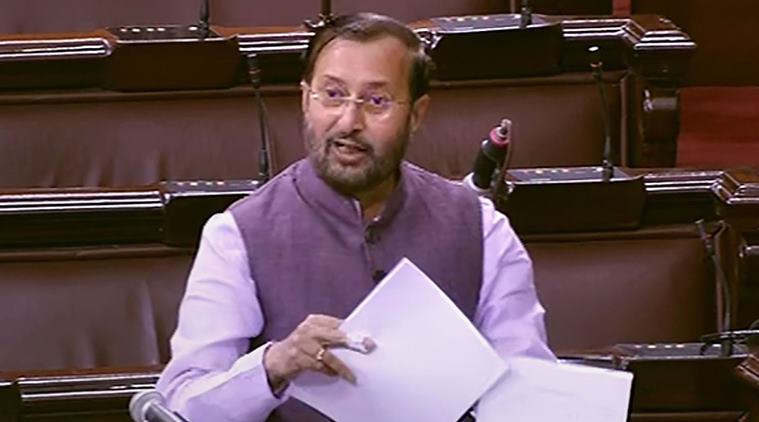Stay updated with the latest - Click here to follow us on Instagram
Delhi’s air quality improved in last three years: Javadekar informs Rajya Sabha
The minister also informed that a high-level task force was set up in November 2017 with the principal secretary to the Prime Minister at the helm. The task-force, he said, is closely monitoring the implementation of measures related to management of air pollution in Delhi and NCR.
 Prakash Javadekar informed that a comprehensive air plan for the national capital region has been developed identifying the timeline and a source-based approach has been adopted to control air pollution.
Prakash Javadekar informed that a comprehensive air plan for the national capital region has been developed identifying the timeline and a source-based approach has been adopted to control air pollution.
Addressing the Rajya Sabha Thursday, Union Environment Minister Prakash Javadekar told the Upper House that the national capital’s air quality has improved in the last three years and the number of ‘good’ and ‘moderate’ days has increased.
“As per continuous Ambient Air Quality Monitoring Stations data, there is a general improvement in air quality of Delhi in 2018 from 2017,” Javadekar said.
According to a report tabled by Javadekar, the number of ‘good’, ‘satisfactory’ and ‘moderate’ days has increased to 159 in 2018 as compared to 152 in 2017 and 106 in 2016, while the number of ‘poor’, ‘very poor’ and ‘severe’ days has reduced to 206 in 2018 compared to 213 in 2017 and 246 in 2016.
“In Delhi, reduction in PM 2.5 levels in 2018 is 7.3 per cent over 2017 and 14.8 per cent over 2016. In Delhi, reduction in PM10 levels in 2018 is 8.6 per cent over 2017 and 16.5 per cent over 2016,” the minister informed.
“Further, there is overall improvement in air quality of Delhi in 2019 (from January-November 19) successively since 2016. The number of ‘good’ to ‘moderate’ days increased to 175 in 2019, as compared to 158 in 2018 while the number of ‘poor’ to ‘severe’ days reduced to 148, compared to 165 in 2018,” the report said.
The minister also informed that a high-level task force was set up in November 2017 with the principal secretary to the Prime Minister at the helm. The task-force, he said, is closely monitoring the implementation of measures related to the management of air pollution in Delhi and NCR.
He also informed that a comprehensive air plan for the national capital region has been developed identifying the timeline and a source-based approach has been adopted to control air pollution.
Javadekar stated that in order to prevent stubble burning, a new central sector scheme on the promotion of agricultural mechanisation for efficient management of crop residue in the states of Punjab, Haryana, Uttar Pradesh being implemented.
(With inputs from PTI)







